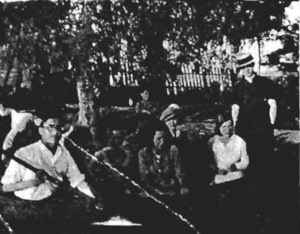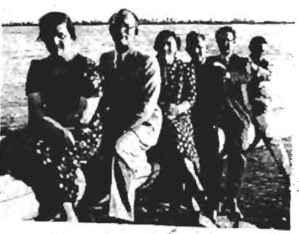 |
 |
|
|
[Page 69]
|
|
|||
|
|
|||
Dr. Rabinovich and his wife, Tova, and Idis Konstantinovsky, and Yosef Berkovich (husband of Idis) |
|
|
|
|||||
and Lionya Rozental |
eight meters from the shore |
[Page 70]
|
|
|||
and David Zinger |
The rest of the people are unknown, waiting for identification |
|
|
|||
with Neta Blechman and Moshe Feigin |
|
|
|||
[Page 71]
|
|
|||
Roza Dizhur (Ofen), Sara Weisman, Shelya Strakhilevich (daughter of Leib), and Tonya Barshadskayar |
and Shuka Finkelshtein |
|
|
|||
from Ismail, and Sashan |
|
|
|||
[Page 72]
|
|
|||
Shelya Strakhilevich, Roza Dizhur, and Malka Konstantinovsky |
|
|
|||
and her parents, and three unknowns |
|
|
[Page 73]
|
|
| From right to left: Nunya Weinshtein, z”l, Tonya Davidovich, Unknown, Riva Berkovich, z”l, Riva Barshadsky, Lionya Barshadsky (Ben Shmuel), Fanya Rabinovich, Tanya Weinshtein, and Khaimovich (daughter of Kalman) |
|
|
|
|||||
In the background, the ruins of the walls of Old Kiliya |
Hebrew/Russian text:
[Page 74]
Josefina Aronovich (Kogan)
I was born into a well-to-do family. They owned a big general store. Even my mother worked there. My brother, Fava, was six years older and had his own friends. I did not find warmth in our big home but found it in the homes of our neighbors, the Likhovtsky and Krasniansky families.
Roza Likhovtskaya was a poor widow with three daughters and two sons. Roza[1] worked for days on end and was not home. The older daughter and son also worked. The middle daughter, Sheyva, was a seamstress and a fashion designer. At first she was Feldshtein's apprentice, and then she worked at home. Arele, the second son, worked as a tinsmith with Kupershmidt. Most of my time was spent with the youngest daughter, Chana, who was my age. I spent almost all my time there. I would play, eat, and even sleep there. I felt part of this family, and it was joyful when they were together, singing and joking around. When I returned home late, my parents did not worry because I was in good hands.
There were times that were difficult. Because they could not pay taxes, the “Percep?ia,” the Romanian tax authority, came often to their home and confiscated their one treasure – the sewing machine.[2] It was unbearably difficult to hear how they pleaded with the tax men and how they cried and screamed. I went to my father to ask him to help them, and he did.[3] Our studies and the war scattered us around the world, and I only met again with some of them in Israel after 35–40 years.[4]
The Krasniansky family had five people. The father traded grains in the market. Aunt Chava was a homemaker with three daughters. The daughter Sara did tutoring in homes, Roza worked on beautiful embroideries day and night, and Aniata, the youngest, went to school with me. We were in the same class until the third grade of Gymnasium, when she had to leave because of their difficult financial situation. In the summer, they managed decently, but when the Danube froze in the winter and the town was shut down, they ate only one meal a day. In the evenings the father would bring home a piece of black bread under one arm, as well as 100 grams of sugar cubes, and they ate that with a cup of Russian tea. He would smile as he entered the kitchen, where Aunt Chava was putting on the teakettle, and say, “Zhozenka, sit at the table with us. We will drink Wissotzky tea with Brodsky sugar.” They divided the black bread into six pieces, and we also received a piece of garlic to go with the bread. Another time, he brought a piece of Dutch herring[5]. It was also divided into six pieces, and Aunt Chava added “potatoes in uniform,” which were potatoes in their skins and some onions. That was all, and it was very tasty. I will not forget the friendly and joyous atmosphere of that home, the laughter, the chatter, and Aunt Chava's Hershele Ostropolier stories. I always went home full and satisfied.[6] I learned to speak Yiddish there. I also learned that happiness is family warmth and not riches. I am very grateful for that to this day. I know that there were many other wonderful families like these in our little town.[7], [8]
[Page 75]
|
|
Oil painting by Lyova (Son of Volodya) Safris |
[Page 76]
|
|
|
|
|||
B. Fidelman, and B. Leventinsky (Shmul Pesta Club?) |
|
Translator's notes:
|
|
JewishGen, Inc. makes no representations regarding the accuracy of
the translation. The reader may wish to refer to the original material
for verification.
JewishGen is not responsible for inaccuracies or omissions in the original work and cannot rewrite or edit the text to correct inaccuracies and/or omissions.
Our mission is to produce a translation of the original work and we cannot verify the accuracy of statements or alter facts cited.
 Kiliya, Ukraine
Kiliya, Ukraine
 Yizkor Book Project
Yizkor Book Project
 JewishGen Home Page
JewishGen Home Page
Copyright © 1999-2026 by JewishGen, Inc.
Updated 12 Mar 2023 by JH